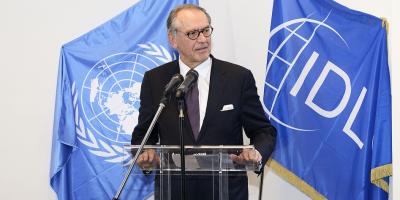
Deputy United Nations Secretary General Jan Eliasson has offered a robust defense of the rule of law in a speech to IDLO during a visit to Rome. “We want to create a stronger basis for our [the UN's] work,” he told the audience, which included Commissioner for Human Rights Navi Pillay, the World Food Programme’s Ertharin Cousin and Phumzile Mlambo-Ngcuka of UN Women. “To jump from one crisis to the next,” said Mr. Eliasson, a former UN humanitarian chief and foreign minister in his native Sweden, “is one of the most frustrating things you can do.” Referring to the Post-2015 Development Agenda now under discussion, he added that “we should not miss this historic opportunity to use the elements of the rule of law”. Mr. Eliasson later spoke in more detail to IDLO’s news editor, Andre Vornic.
Andre Vornic: The rule of law, human rights – where do they meet? Are they synonymous?
Jan Eliasson: Human rights and the rule of law are like Siamese twins. They belong together, but they also belong in a wider context, that of peace and security. And they are related to development: there is no peace without development, no development without peace, and none of the above without respect for human rights and the rule of law. Those are the pillars of the United Nations, which always have to be strengthened at the same time.
AV: Do you ever feel we’re trying to shoehorn too much into the rule of law?
JE: The rule of law is such a wide concept that I think we need to be concrete and practical about it. In the context of peace and security, for instance, the rule of law means that we create institutions and mechanisms to make sure conflicts don’t erupt again. In development, it means anti-corruption; it means respecting women’s rights; it means having a legal system that works. The rule of law is indeed a culture of justice, as IDLO’s logo says, but also strong institutions. Institutions create continuity and strength behind the rhetorical declarations we sometimes make about poverty and development and human rights. If we don’t have the institutions, things fall apart very easily, as we have seen far too often in today’s world.
AV: Precisely. Syria, South Sudan, Ukraine: are we failing to create the institutions?
JE: I think we can say that some of today’s failures are partly due to the fact that there were not – and are not – strong, honest, well-functioning institutions. If I look back at my own life as a minister in the Swedish government, perhaps we didn’t do enough when we were cooperating with countries, not least in Africa and Asia and Latin America, to make sure that we built on that. Because our own country built its prosperity and democracy on strong, honest, well-functioning institutions. For me, this is a very important aspect to keep in mind as we face the task of devising a Development Agenda for the post-2015 period.
AV: Are you suggesting that you should have demanded more conditionality?
JE: I wouldn’t say ‘conditionality’. I would say that in a dialogue, in a conversation with member states, it would be very easy to conclude that if they wanted to ensure they achieved what they wanted to achieve, they also needed the institutions. I don’t think it should have been imposed, I think it should have come very naturally. But unfortunately, it wasn’t as much part of the dialogue as it should have been.
AV: Let’s say we manage to write the rule of law explicitly into the upcoming Sustainable Development Goals. What difference will that make?
JE: It will make a very big difference if we add this qualitative dimension to the Goals, the Targets, whatever they will be named. If we don’t have that qualitative dimension, we run the risk of this becoming more rhetorical than substantive. […] If you look through the potential next-generation goals, then there is always a rule-of-law component. So I would hope that in the negotiations that take place, they [countries] think both of the overriding interest of showing generally the importance of a culture of justice, but also, for each goal, of discussing how this becomes reality. And that, again, requires strong institutions.

